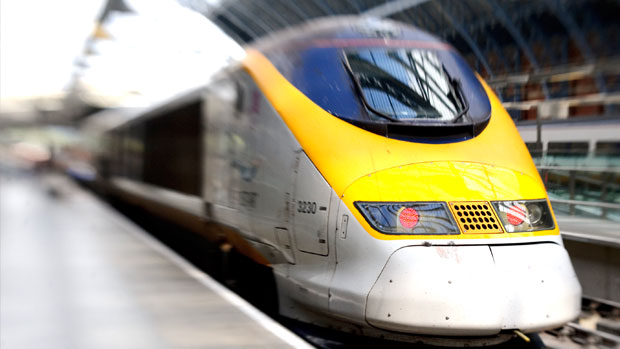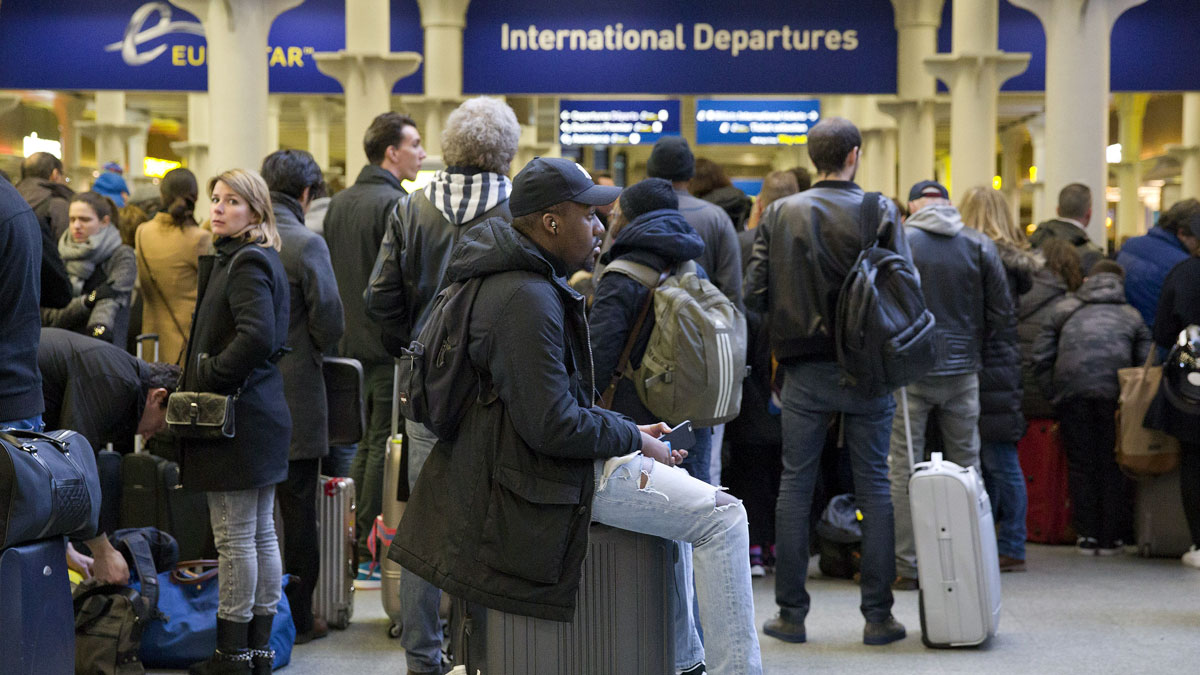Eurostar stake sold for more than £750m after 'fierce' battle
Anglo-Canadian consortium to buy 40% stake in Eurostar for significantly higher sum than analysts predicted

A free daily email with the biggest news stories of the day – and the best features from TheWeek.com
You are now subscribed
Your newsletter sign-up was successful
The government is due to sell off its stake in Eurostar for more than £750m, a significantly higher sum than analysts had predicted.
Following a "fierce six-month bid battle", the Anglo-Canadian consortium, Patina Rail LLP, is buying the state's 40 per cent stake for £585.1m, reports the Daily Telegraph.
This is almost twice the sum originally anticipated last October when the Treasury announced it would sell off its stake as part of a broader plan to privatise a number of state assets and bring down the nation's debt.
The Week
Escape your echo chamber. Get the facts behind the news, plus analysis from multiple perspectives.

Sign up for The Week's Free Newsletters
From our morning news briefing to a weekly Good News Newsletter, get the best of The Week delivered directly to your inbox.
From our morning news briefing to a weekly Good News Newsletter, get the best of The Week delivered directly to your inbox.
Eurostar has also agreed to buy back the government's preference shares as a side-deal for £172m. This means the Treasury can make a "clean exit" from the company, netting a total of £757.1m from the stake sale and the agreement with Eurostar.
Osborne described the sell-off as a "fantastic deal for UK taxpayers that exceeds expectations".
The Telegraph notes that the sale is "so far" removed from the controversy that surrounded the Royal Mail privatisation.
Danny Alexander, the Liberal Democrat Treasury chief secretary, who hopes to raise £20bn from selling government assets between 2014 and 2020, welcomed the sale, adding: "There's no virtue in the government owning assets it doesn't need to."
A free daily email with the biggest news stories of the day – and the best features from TheWeek.com
There were around 20 expressions of interest to take a stake in the train operator, says the Financial Times. The consortium that won the deal is made up of two companies: London-based asset manager Hermes Infrastructure and Canadian pension fund Caisse de dépôt et placement du Québec (CDPQ).
French and Belgian railway firms SNCF and SNCB are retaining their combined 60 per cent stake in Eurostar, which has carried more than 150 million passengers since its services began in 1994, including more than ten million passengers in 2014 alone.
The company is investing £1bn on new trains as it "attempts to lure more passengers from air travel", says the FT, with plans to offer direct trains to Lyon, Avignon and Marseille from May, and services between London and Amsterdam from 2016.
Eurostar sale: bidding begins amid 'controversy and confusion'
14 October
George Osborne has courted controversy by appointing UBS to oversee the UK government's sale of its 40 per cent stake in Eurostar, in spite of the Swiss bank having been accused of "botching" the sale of the Royal Mail last year.
Bids for the government's 40 per cent stake in the cross-Channel train operator must be made before the end of this month. The sale is part of the Treasury's broad plan to privatise a number of state assets to try to bring down the nation's £1.4 trillion debt.
Yet the choice of UBS as the bank to oversee the sale has overshadowed the sale itself.
Why is the choice proving so controversial?
Several months after the privatisation of the Royal Mail last year, UBS, together with Goldman Sachs and Lazard, was hit with accusations that they had "ripped off" the British taxpayer, The Independent's Lucy Tobin explains. This year, MPs on the business select committee said under-pricing the sale had cost the taxpayer more than £1bn, the Daily Telegraph reports.
Bidding for the rail network opened in "controversy and confusion," saysThe Times's Robert Lea. UBS's role in running the sale has "incensed MPs," who were deeply critical of the bank's role in the "botched" sell off of the Royal Mail last year.
After Osborne formally announced the government's intention to sell off its stake in Eurostar, Labour's shadow transport secretary Mary Creagh, said: "The National Audit Office should urgently conduct a value-for-money enquiry before this sale proceeds. We must ensure that taxpayers are not ripped off again by bungling ministers and poor financial advice from the City."
But the problems with the government's plan go deeper than just the selection of UBS to oversee the sale, critics argue.
Other issues
The deadline the Treasury has imposed for the sale falls before an announcement on whether Eurostar's bid to take over the operation of Britain's East Coast main line is to be successful or not.
"If Eurostar wins the East Coast tender, that will greatly increase the value of the asset," a leading rail executive told The Times. "What then will be the full value of the asset?"
Other issues for potential bidders include how much it will cost Eurostar to upgrade of the current fleet as well as the potential impact of competition that will emerge before the end of the decade from high-speed train operator Deutsche Bahn.
At the very least, the sale must be delayed Creagh argued: "UBS made millions from Royal Mail and is advising on the Eurostar sale. Lord Myners is still conducting his review into government privatisations after Royal Mail and ministers should await his report before any sale begins."
Eurostar sale: government to sell 40% rail stake
13 October
George Osborne will today announce his intention to sell the government's 40 per cent stake in Eurostar before the next election.
The move to privatise the British share of the cross-Channel rail operator is expected to raise up to £300m and comes as part of broad plans laid out last year by the coalition's Autumn Statement and National Infrastructure Plan, which raised the prospect of extensive corporate and financial asset sales in a bid to raise £20bn by 2020. Britain has held a stake in Eurostar for the past 20 years, but the Chancellor will say that the sale will help ease the country's debt, the BBC reports.
"I am determined that we go on making the decisions to reform the British economy and tackle our debts," he will say. "Ensuring we can deliver the best quality infrastructure for Britain and the best value for money for the taxpayer are key parts of our long-term economic plan."
But Mick Cash, general secretary of the Rail, Maritime and Transport Workers union, said the sale could result in more of Britain's rail network ending up under foreign ownership."This compounds the issue of foreign ownership of Britain's railways as the French state has first refusal on our slice of the highly profitable Eurostar cake," he said. "The French and Belgians think we are insane knocking off such a valuable and strategic infrastructure asset."Osborne will be hoping to "avoid a repetition of the Royal Mail debacle", The Guardian says, when the government was criticised for undervaluing the postal service and handing profits to the institutions involved in the sale.Labour's shadow transport secretary Mary Creagh, said: "The National Audit Office should urgently conduct a value-for-money enquiry before this sale proceeds.
"We must ensure that taxpayers are not ripped off again by bungling ministers and poor financial advice from the City."
-
 Health insurance: Premiums soar as ACA subsidies end
Health insurance: Premiums soar as ACA subsidies endFeature 1.4 million people have dropped coverage
-
 Anthropic: AI triggers the ‘SaaSpocalypse’
Anthropic: AI triggers the ‘SaaSpocalypse’Feature A grim reaper for software services?
-
 NIH director Bhattacharya tapped as acting CDC head
NIH director Bhattacharya tapped as acting CDC headSpeed Read Jay Bhattacharya, a critic of the CDC’s Covid-19 response, will now lead the Centers for Disease Control and Prevention
-
 Eurostar strike: How will walkout affect travellers?
Eurostar strike: How will walkout affect travellers?Speed Read Train managers will down tools over two weekends in August as part of dispute over work/life balance
-
 Government reveals details of £15bn 'roads revolution' plans
Government reveals details of £15bn 'roads revolution' plansSpeed Read Investment in Stonehenge tunnel and M25 among plans to improve network – but will they go ahead?